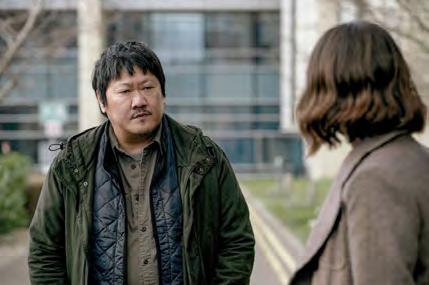
3 minute read
‘3 Body Problem’ star turns the tables on his career
from LA Times (test)
by Marketing
Actor Benedict Wong was ‘all gangstered out.’ So he started representing himself and landed in the Marvel universe.
IN MARCH, AT THE AFTERPARTY FOR THE PREMIERE OF “3 Body Problem” at the South by SouthwestFilm Festival in Austin, Benedict Wong assumed his alter ego. The English actor, known for playing stoic but sly tough guys, morphed into DJ ObiWong, spinning electronic dance records, a wide smile on his face and a sleek virtual reality headset (actually a “3 Body” prop)perched on his head. He was clearly having a blast. ¶ He has earned it. A little more than 10 years ago, Wong was wondering if he still had a career. He had lived on a diet of nondescript Asian background players and generic gangsters. He loved the theater, but it wasn’t paying the bills. He felt like his agents weren’t earning their keep. Today, he’s all over the Marvel Cinematic Universe as a mystic teacher (alsonamed Wong) and playing a bloodhoundlike detective in “3 Body Problem,” Netflix’s mindbending scifi series. He’s become a welcome presence as a character actor in such movies as “The Martian” and “Annihilation,” and on the droll vampire series “What We Do in the Shadows.” He now represents himself, and he’s about to start his own production company, Big Boss Panda.
He’s feeling grateful. “The journey I’ve had, it’s some sort of Asian actor ‘Forrest Gump’ story,” he said in a recent video interview from his London home. “Forces can try and derail you and become an obstacle for you not to succeed. But they just become stepping stones. I feel like the luckiest man alive.”
Wong, 52, is blunt but happily digressive, playful but quite serious. He may feel lucky, but he was never given anything.
He grew up a workingclass kid outside Manchester, the son of Hong Kong immigrants who ran fishandchips shops. “It was its own cage for me, because that’s all I knew,” he said. “I kind of wanted to see the outside world.”
He found escapes, taking in Manchester clubs such as the Hacienda, immortalized in the 2002 film “24 Hour Party People” (the future DJ ObiWong was taking notes). He swept floors at a fringe theater company, sneaked into other theaters around town and caught the acting bug, unable to afford drama school but eager to audition. He joined an actors’ coop and informed his father of his new career plans. His dad wanted him to get a real job. “I told him to give methree years, and if it didn’t work out I’d do whatever he said,” Wong recalled. “It was that kind of dutiful Asian fatherson relationship.”
Wong acted steadily, if not always to great personal or financial reward. He preferred good stage roles to lesser screen roles. On the screen, “I literally played six gangsters in one year. I turned the seventh one down, being all gangstered out. I do have my inner gangster chakra, but you don’t want to play that all the time.” Better parts would trickle in — Stephen Frears’ “Dirty Pretty Things” (2002), Danny Boyle’s “Sunshine” (2007). But the going was slow. Wong felt typecast. He’s a big guy, and he has the demeanor of someone familiar with the streets, but he knew he could do more with such qualities.
“There were months where it was just quite souldestroying,” he said. “And then somehow the universe aligns and throws you a lifeline.”
One of those lifelines was “Doctor Strange” (2016). Wong’s friend and “Dirty Pretty Things” castmate Chiwetel Ejiofor had signed on for “Strange” and told Wong, the actor, about Wong, the character. His first thought: “My luck is in. Come on, I must claim this by birthright, by name alone.” He was his own agent by then, and he got the part, which also meant a foothold in other Marvel projects, including “Avengers: Infinity War” (2018) and “SpiderMan: No Way Home” (2021).
When “3 Body Problem” creators D.B. Weiss, David Benioff and Alexander Woo decided to adapt Cixin Liu’s scifi novel trilogy into a series, they knew immediately whom they wanted to play the enigmatic detective Da Shi.
“Benny was our first and only choice,” the trio said in a joint email. “When we read the books, he was who we imagined, and when we wrote the scripts, he was who we imagined. Yet it wasn’t until we watched him reading his lines for the first time that we truly experienced how fully he embodies that character. He brings a humanity and wit to Da Shi that makes him endlessly watchable. Our show wouldn’t be nearly the same without him.”
“I just keep looking for this exponential curve,” said the soontobe Big Boss Panda. “Onwards and upwards. If it plateaus sometimes, you just have to keep moving.”
Story by Steve Dollar










